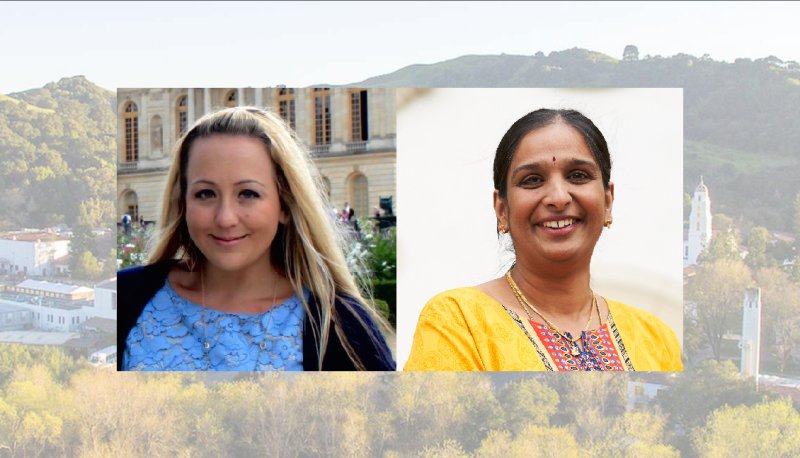
SMC Awarded STEM Grant for Educators
The National Science Foundation Robert Noyce Teacher Scholarship Grant funds programs to encourage STEM majors and professionals to become K-12 mathematics and science teachers, in collaboration with a local school district.
ABOVE: Principal Investigator Mary Candace Raygoza, PhD, assistant professor of Teacher Education; and Co-Principal Investigator Vidya Chandrasekaran, PhD, associate professor of Biology.
Saint Mary’s College is well on its way to enhancing the development, training, and preparation of STEM teachers. On March 2, the College was awarded a $75,000 grant to help address the shortage of STEM teachers in high-need, diverse, urban public schools, led by Principal Investigator Mary Candace Raygoza, PhD, assistant professor of Teacher Education; and Co-Principal Investigator Vidya Chandrasekaran, PhD, associate professor of Biology.
The National Science Foundation (NSF) Robert Noyce Teacher Scholarship Grant funds programs to encourage STEM majors and professionals to become K-12 mathematics and science teachers, in collaboration with a local school district.
“Our proposal was titled “Building Capacity for the STEM Teachers for Justice, Community, and Leadership Program at Saint Mary’s College of California,” which is a program involving the Kalmanovitz School of Education [KSOE], School of Science [SOS], School of Liberal Arts [SOLA], and the Mount Diablo Unified School District [MDUSD],” said Raygoza. “What’s unique about this grant is that we will be bringing together partners from the three different schools on campus to create undergraduate STEM teacher education programming that is centered around equity and social justice to be prepared to teach in local urban schools, and to teach culturally and linguistically diverse learners.”
“What’s unique about this grant is that we will be bringing together partners from the three different schools on campus to create undergraduate STEM teacher education programming that is centered around equity and social justice to be prepared to teach in local urban schools, and to teach culturally and linguistically diverse learners.”
Saint Mary’s will work to develop the undergraduate STEM teacher education program. The College currently offers a graduate credential for secondary high school teachers; however, there currently isn’t an integrated undergraduate pathway to become a STEM teacher. “The state of California just a couple of years ago changed policy and now has allowed higher education institutions to grant a teaching credential alongside of a bachelor’s degree. One of the things we’ll do with this grant is to plan for the possibility for offering that pathway, or a ‘four plus one’ pathway for undergraduates to become STEM teachers,” said Raygoza.
Raygoza acknowledged that there are not many, if any, undergraduate STEM teacher education programs with an explicit and intentional focus on social justice, community, and leadership. She expressed that by having this targeted focus, in coordination with SOLA’s Justice, Community, and Leadership Program (JCL), teachers will be well-prepared to center equity and social justice, especially when teaching diverse learners. “We want to do what we can to help STEM teachers sustain themselves in this profession, and that’s one of our big goals through the grant,” said Raygoza.
The NSF grant is centered around five specific activities: (1) Conducting a needs assessment of STEM teaching and learning by engaging youth and their teachers in MDUSD partner schools, as well as students and faculty at SMC, in surveys and focus groups to better understand the gaps and challenges in STEM teacher preparation; (2) Deepening the College’s existing partnerships with five MDUSD Title I middle and high schools; (3) Developing a robust undergraduate STEM teacher education program, with partners from KSOE, SOS, and SOLA to leverage and synergize existing programs at SMC; (4) Enhancing institutional knowledge of recruiting, preparing, and sustaining diverse STEM teachers; and (5) Establishing a mechanism for long-term sustainability and evaluation of the program, including an advisory board of SMC and district partner stakeholders to identify and reflect on strengths, areas of improvement, and visions for the future.
“The Noyce grant will help the College enhance our institutional knowledge of how we can recruit, prepare, and sustain diverse STEM teachers. And with this grant, it also positions us to apply for future funding that would support scholarships for students in the program,” said Raygoza.
There was deep collaboration on all facets of the grant, including faculty and staff from across KSOE, SOLA, and SOS, in addition to key administrators and district partners from MDUSD. Bringing together the different areas of expertise was key to develop the integrated programming grant proposal. “Elizabeth Gallagher, director, Office of Research, was tremendously helpful in supporting the grant through fruition. And KSOE’s new Dean Carol Ann Gittens came with us to the Mount Diablo Unified School District to present the proposal to our district partner. Also providing key support in this effort was Roy Wensley, dean of SOS, and Sheila Hassell Hughes, dean of SOLA. This is a really wonderful and unique team effort,” said Raygoza.
This story appears in the Spring 2021 edition of Saint Mary's Magazine.
LEARN MORE about the people and programs at the Kalmanovitz School of Education.